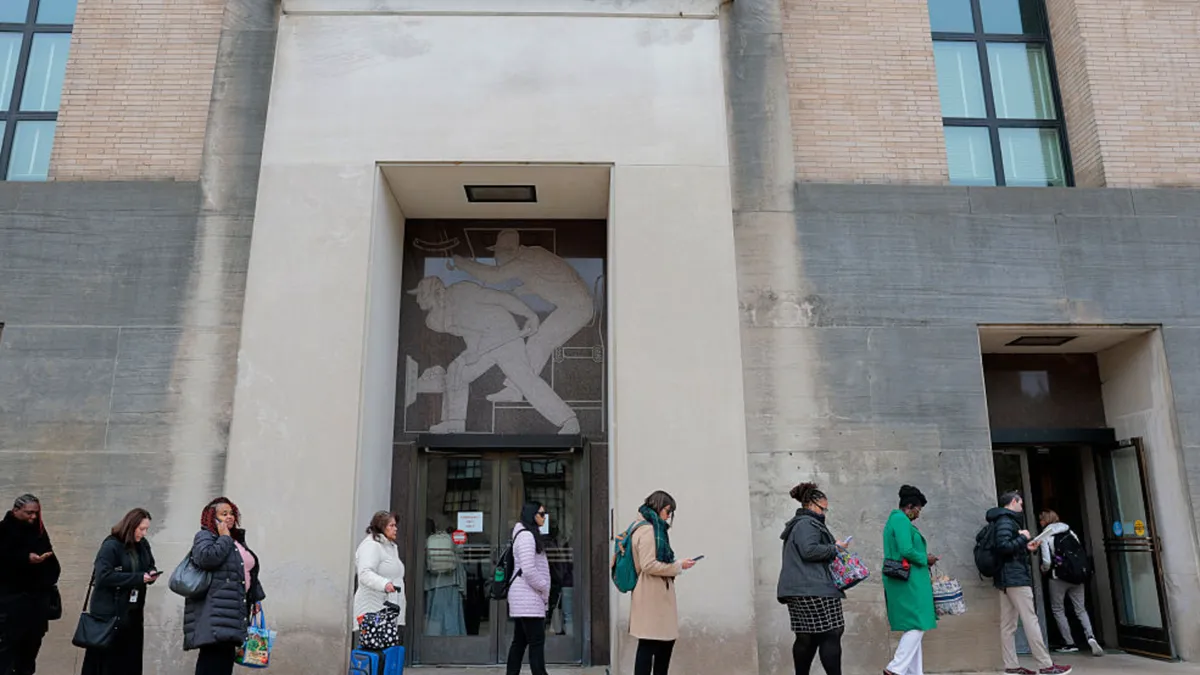A federal judge last week dealt the first major blow to plaintiffs challenging the Biden administration’s Medicare drug price negotiations, declining to temporarily halt implementation of the program and questioning a leading argument in the case.
Judge Michael Newman, a Trump-appointed judge in Ohio’s Southern District, denied a request for a preliminary injunction by the U.S. Chamber of Commerce, holding that the business group showed “neither a strong likelihood of success” in its case nor proof that Medicare negotiations would cause immediate and irreparable harm.
Although Newman did not issue an opinion on the merits, the judge also appeared skeptical of the Chamber’s argument that Medicare negotiations violate the Fifth Amendment’s Due Process Clause. The chamber’s case, and many of the eight cases brought by pharmaceutical companies against Medicare negotiations so far, have argued that the drug pricing program is a form of government coercion because companies face a heavy financial burden if they choose not to participate.
However, “participation in Medicare, no matter how vital it may be to a business model, is a completely voluntary choice,” Newman wrote.
His ruling on the preliminary injunction is among the first major decisions in any of the nine cases challenging the Medicare drug pricing program passed under the Inflation Reduction Act last year. The cases, brought by companies like Merck & Co., Bristol Myers Squibb and AstraZeneca, attack the law from all sides and are expected to wind their way all the way up to the Supreme Court for a final decision.

Of course, that’s partially by design on the part of the plaintiffs who’ve thrown “everything including the kitchen sink” at the law, Robin Feldman, a professor at University of California Law, said.
“They claim it violated more constitutional provisions than most people know exist,” Feldman said, but noted that the industry’s main critiques of the law related to the First and Fifth Amendments could be difficult to prove.
Here, Feldman provides insights into where holes exist in the industry’s lawsuits.
A shaky First Amendment case
Merck, BMS, Novo Nordisk, Novartis and Janssen all assert that the IRA violates their First Amendment rights by forcing them to agree against their will that they are negotiating a “fair price” when they sign on to participate in the program.
“While the government may choose to deceptively describe the program as involving an ‘agreement’ to ‘negotiate’ a ‘fair’ price, it cannot force manufacturers to echo its misleading messaging,” Janssen said in its complaint.
But the argument could be a stretch, Feldman said, because it would require the court to consider a contract a form of compelled speech.
“It's hard to imagine the government will require companies to sign a paper saying, ‘I declare this is a fair price,’” she said.
Faults with Fifth Amendment arguments
Any way you slice it, the industry could also run into challenges when trying to prove that Medicare negotiations violate the Fifth Amendment’s Takings Clause, which prevents the government from grabbing private property for public use without “just compensation,” Feldman said.
In its complaint, for instance, Janssen applies the Takings Clause to patents, asserting that Medicare drug negotiations “force manufacturers to relinquish their patented drugs … and retroactively rescinds the bargained-for patent and regulatory exclusivity protections that fuel innovation.”
However, there’s no precedent for applying the Takings Clause to patents, and even some conservative justices on the Supreme Court have appeared skeptical of the argument in the past, Feldman said.
"They claim it violated more constitutional provisions than most people know exist.”

Robin Feldman
Professor, University of California Law
In a 2018 opinion in the case Oil States Energy Services v. Greene's Energy Group, Justice Clarence Thomas suggested that patents are not akin to property rights, but rather are government granted franchises. And because the court does not view patents as private property, Feldman said the issue remains undecided.
If the court did apply the Takings Clause to patents, it “would be like the shot heard round the world,” Feldman said.
Novartis, for its part, argued the government is physically taking its property under Medicare price negotiations.
“Pharmaceutical manufacturers are forced to surrender their private property, which will be physically taken for the federal government’s public use, to Medicare beneficiaries at below-market prices,” the company said in its complaint.
However, without evidence the government is “breaking into pharmaceutical store houses and requisitioning drugs for the army,” Feldman said it’s difficult to prove that drugmakers are physically losing control of their property.
Other cases raise a different type of Fifth Amendment claim called a “regulatory takings,” arguing that the government has reduced the value of their drugs to the point of theft.
In its complaint, for instance, Merck said: “The Fifth Amendment requires the government to pay ‘just compensation’ if it takes ‘property’ for public use. Yet the singular purpose of this scheme is for Medicare to obtain prescription drugs without paying fair market value.”
Feldman expressed skepticism about that argument too, noting that “regulatory takings cases are rare and would be particularly unusual in the context of a healthy return for the party claiming that the property has been taken.”



















